Intercultural wannahaves: Dixis, cycle paths and karaoke bars
Sooner or later internationals at TU/e feel a yearning for something back home. Like the Asian student wandering along the Stratumseind in a fruitless search for a karaoke bar. Vice versa, however, the Netherlands does offer elements these internationals would like to take back with them. Cursor asked ten international students about their intercultural wannahaves.
Dixis and karaoke bars
Gengzhe Wang (26)
China
Urban Planning
“Whether we'd be doing you Dutch people a favor, I don't know. But believe me, the South Asian community in the Netherlands would be thrilled to see more karaoke bars in this country. That's evident from the hoards that visit the few karaoke cafes you'll find in the larger cities. Here in Eindhoven I haven't seen any at all, yet I think they would draw a big enough crowd, what with all the expats and students milling about here. Where I come from they are commonplace; you'll find a karaoke bar on just about every street corner.
The thing I would like to take back home is the Dixi you have here. The mobile WCs you see at festivals. We don't have anything like that in China. For toilet facilities you have to rely on the nearby bars and cafes, where you stand in line forever. Those square enclosures, with a urinal at each corner, are also ideal. For men that is. I would like to take one with me so I could persuade my family to buy them. But it won't be as easy as all that.”

Toilet douches and spicy food
Akshay Kothari (24) and Vedant Sundrani (24)
Both Automotive Technology
India
Vedant: “Really? We aren't the first people to mention toilets? Well then, it is apparently a very culturally dependent subject. At any rate, we found it took quite some getting used to not having a toilet douche and having to use the alternative: toilet paper. In India after every bathroom visit we rinse our butts with what is called a toilet douche. Here, we suddenly found our only option was to wipe with paper. We haven't yet decided what is better or more hygienic so it is too early to start swapping the two bathroom habits. Even so, it is a remarkable thing. By the way, we soon got used to using that paper!”
Akshay: “Real gains for India that we could take from the Netherlands...no, we haven't yet discovered anything. So I'm going to mention an import suggestion for the Netherlands: spicy food! Although you are on the right track and, for example, the TU/e canteen already has an Indian corner, the quality could be better and, most importantly, it could be cheaper. We find the Mensa too expensive so we usually buy our spicy food from a takeaway place at the station. But I really wonder whether the Dutch are eager for their food get more spicy.”
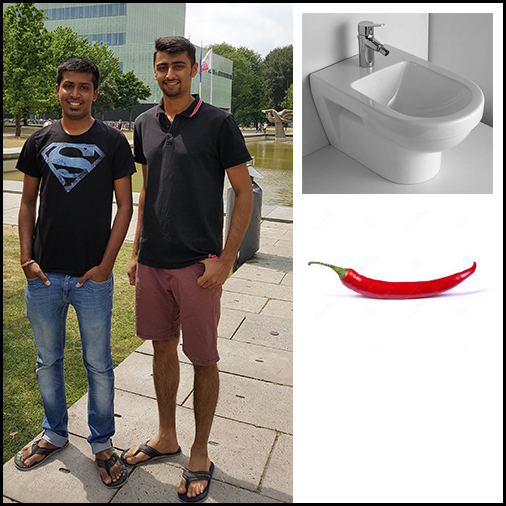
Mixed culture related to food
Matteo Basso (25) and Dario Sposini (25)
Italy
Architecture, Building and Planning
Dario: “We advocate an intercultural exchange between Dutch and Italian cuisine, with a view to enriching both cuisines. It is not so much our pastas that we miss here in the Netherlands but the taste of vegetables. Take your tomatoes, for instance. If you ask me, they are pretty tasteless. Italy imports a good many tomatoes from Albania. They know how to make them flavorful there. You Dutch grow a lot of vegetables yourselves, but first you have to learn how to get some flavor into them.”
Matteo: “Something I do really like here is having all the exotic places to eat. If a Dutch food culture already exists, then it is like a sponge that soaks up elements from other food cultures. You see it in the stores, where so many foreign products are available. Such a mixed culture when it comes to food isn't something you see in Italy - every though we get do our tomatoes from abroad.”
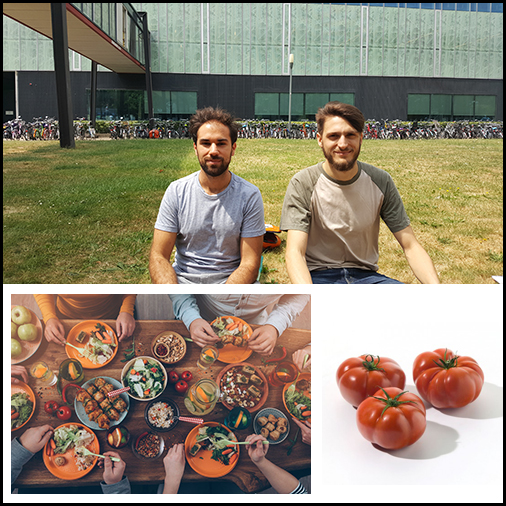
The smile and cycle paths
Karen Huaracha (27) Innovation Sciences and Helena Rodriguez (20) Sustainable Innovation
Mexico
Karen: “I would like to import the smile to the Netherlands. You are actually a cheerful country, but not when it comes to the first encounter. Then you are straight-faced and businesslike. I noticed that right away, when I was first here. We Mexicans always greet each other with a smile, without any ulterior motive. Here that would likely be interpreted as a covert attempt to hit on someone. Additionally, I would really like to import our Mexican opening hours for stores. In Mexico, many if not all supermarkets are open 24 hours a day. Yes, on Sunday too. Here most stores close at 8 p.m.”
Helena: “If we leave behind that smile and the opening hours, we'll have space in our suitcase to take some fine Dutch heritage back home. In that case, I would like to import your cycle paths. The cyclist is considered sacred here and is given plenty of space by both the government and fellow road users. What a difference from Mexico, where cyclists take their lives in their hands. Oh yes, and in Mexico we could certainly use your efficiency and resolute action in construction projects. You can bet your life on it that the construction work here at TU/e will be completed. But in our country a building contractor might down tools halfway through a project and simply never return.”
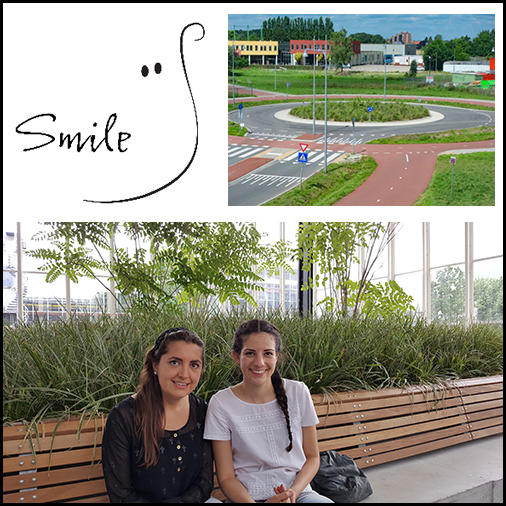
Stroopwafels and toilet lids
Miriam Afework (23) Media Technology and Amanda Paulus (23) Industrial Engineering
Sweden
Amanda: “If we come to the Netherlands again, next time we'll bring a truckload of toilet seats and lids. In Sweden we are used to covering the toilet before we flush. So that it doesn't splash everywhere. But you guys are apparently happy for everything to flush away uncovered. Not exactly a feast for the eyes, nor is it hygienic.” Miriam adds: “There isn't even some way to cover the toilets at TU/e. I can't help wondering whether this is a deliberate choice. Whether it also bothers other guest students here, I can't say.
Let me tell you what we'll be taking a boxful of back to Sweden... your stroopwafels. We discovered them here and can't keep our hands off them. They are pretty different from knäckebröd.”
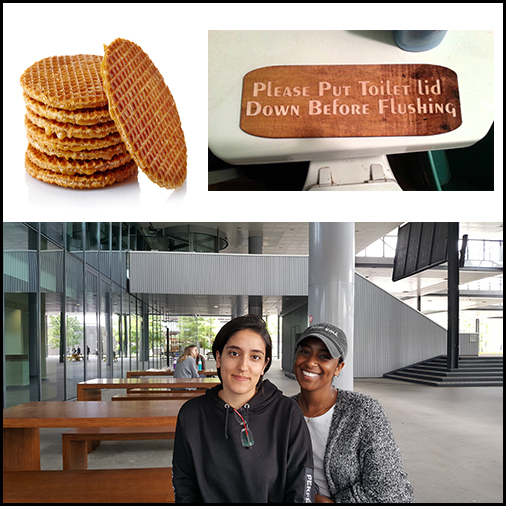
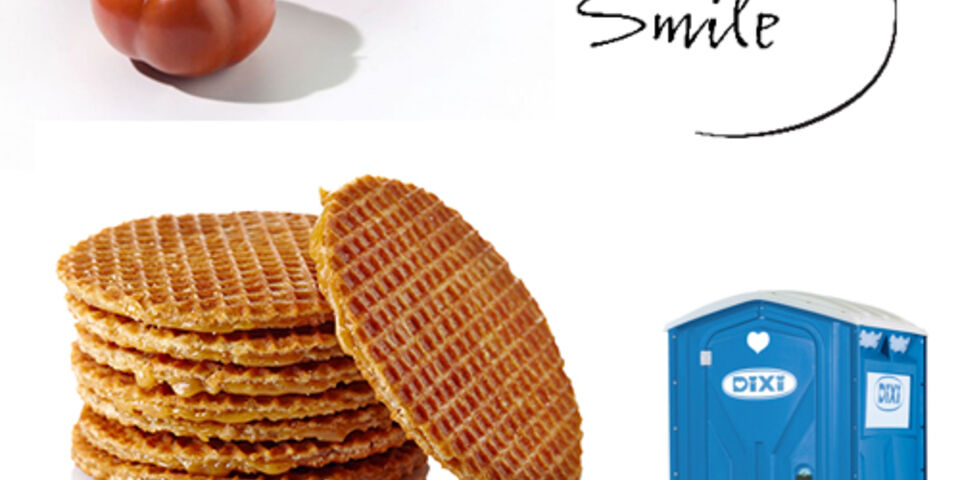

Discussion